- Home
- A. S. Byatt
A Whistling Woman Page 3
A Whistling Woman Read online
Page 3
You are thinking of yourself, her mind snapped, but she didn’t say. She repeated “We shan’t see each other.”
“Not like this. No. Is that too bad? Where are we going, Frederica?”
“Nowhere at all,” she did finally snap, “if you go to the other end of the country, just like that.”
“I thought perhaps you wouldn’t mind too much,” he said.
She could not think quickly enough of a truthful answer to this. Would she? At the moment she felt like an abandoned child in a forest. John Ottokar said in his hesitant, unused voice
“And if it turned out you did mind, we could work something out. You’ve got family up there. It’s not an impossible place.”
“I escaped from it. I left the North. I live here .”
“Well then,” he said, peaceably, meaninglessly.
Frederica had an image of her several selves, the child, the woman, the mother, the lover, the solitary, tangled like coiling snakes in a clay pot, turmoiling. She said, changing tack
“I wondered if you wanted to come to the Science Museum with Leo and me on Sunday. You tell him things I can’t—”
“I can’t do that. There’s a meeting of the Spirit’s Tigers. Paul needs me to go.”
“Why does he always need you? He’s got all those groups—the Tigers, his psychotherapy group, his Zag and the Syzygy Zy-goats, why does he always need you?”
“You know why. I’m the other half of the original group of two. You know that.”
This was part of their usual repeated talk, something they went over each time they met.
“No one appears to consider what you need. Not the Quakers, not the music-people, not even the psychoanalysts.”
“That’s true. I’m the strong one, you see. Contrary to appearances, I’m the strong one.”
“That doesn’t give them a right to see you in terms of him.”
“I see myself in terms of him, Frederica. I try not to, but I do. I always have. That’s how it is.”
“I know.”
“If you don’t want me to go to the UNY, I won’t.”
“I don’t have an opinion. Or a right to one. You must do what’s best for you.”
They were not quarrelling, they were sad. John Ottokar gave up the effort of talking, touched her breast and her belly until she turned to him, and they made love again.
Frederica thought, the next day, this will all reduce itself to a few mnemonics. His face on the glass, an image I have of our four legs like two pairs of scissors. Why do I have to be in this hurt, when I’m not sure there’s any real reason to be hurt, when I can imagine afterwards with clarity and probably accuracy?
Was the fact that she was put out an indication of Love, after all?
She thought of Leo. Another man’s son, a man himself now partly reduced to manageable mnemonics. Also, her own son. She got on with Leo in her own odd way because she wasn’t motherly. There wasn’t an ounce of cuddle or home-making in her thin body. But the person she was recognised fiercely and absolutely the person he was, and respected him.
She thought, if she had to, she might even die for Leo. It was silly to think about that, it either happened or didn’t. But the readiness was there, and surprised her.
Chapter 2
Snails are best observed at dawn, after rain. The light on Gungingap Scar was full of water, trembling and iridescent. The valleys, like the fingers of a giant glove, which radiated out from Mimmer’s Tarn were full of veils and scarves of wet mist, evaporating in twists and flourishes. Moving through this liquid atmosphere, the searchers—however well they knew the terrain—had a pleasant sense that the hills were flowing, changing shape like waves, that solid stones and wind-twisted hedges loomed suddenly out of wool or spume, where a moment before there had been nothing. The water-drops on thorns and thistles were glittering prisms, full of many-coloured lights. And across the wet turf, over the dry-stone walls, the snails slid fluently, creating an intricate net of silvery ribbons, their shells glistening with water, their dove-grey translucent bodies glistening with their own secretions, their fine horns wavering before them, testing the air, peering quietly around. Their shells were variegated and lovely, some a delicate lemon, some a deep rose, some a greenish soot-black, some striped boldly in dark spirals on buff, some with creamy spirals on rose, some with a single band of dark on gold, some like ghosts, greyish-white coiled on chalk-white. Most of these were Cepea nemoralis and had rich black lips, but some—not many—closely resembling the nemoralis in other ways, were white-lipped Cepea hortensis. Several also bore glossy blue, or green, or crimson dots on their shoulders, placed there by the latest group of researchers to track their movements and their fates.
The snail populations of Dun Vale Hall, and the surrounding moorland of the rich limestone of Gungingap, had been studied by several generations, beginning with a Victorian vicar, Richard Hunmanby, and an Edwardian schoolmaster and distinguished amateur conchologist, Joseph Mann. Luk Lysgaard-Peacock and Jacqueline Winwar were attempting to study the population genetics and the biological diversity of the creatures who obligingly carried their histories, written like hieroglyphs, on the coiling, brittle houses on their backs. They compared the incidence of one, two and three stripes, of dark and light shells, with the records of their predecessors. In the days of Hunmanby and Mann, the snails had been known as Helix, not Cepea, hortensis or nemoralis. Hunmanby had been of the opinion that nemoralis and hortensis were distinct species. Mann was not sure. He had observed that the creatures lived together and intermingled, but had more than once observed large numbers of both kinds clustered, intertwined, high in the branches of beech-trees.
“My object in climbing amongst them—in the case of those individuals who were very high in the trees I used a pair of powerful field glasses, discretion being the better part of valour—was to ascertain whether matrimonial alliances between these two forms are usual or not. In one avenue of beech-trees, decked with shells, I counted sixty happy couples, twenty-five of which were hortensis, the rest nemoralis. In all my observations I saw no single instance of such cross-marriages—the ‘black-mouths’ invariably paired with ‘black-mouths’ and ‘white-mouths’ with ‘white-mouths.’ There is also the smaller variety H. hybrida, smaller with a pink or brown mouth and rib, which I have never observed to mate at all.”
The object of Jacqueline Winwar’s thesis—which was nearly completed—was to ascertain whether the changes in the populations—fewer striped shells, more single-coloured—were influenced more by heredity and Darwinian selection, or by immediate changes in the environment. Did woodland dappling favour stripes? What effect was the recent diminution in the thrush population having? Luk Lysgaard-Peacock’s concerns with population genetics were larger and more varied, but his field-work with these snail populations had been continuous for some years now, and was beginning to show some interesting (if anomalous) patterns.
They worked well together, moving quietly across the wet ground, charting the numbers and positions of this and that colour and form. They worked at snail-level and snail-speed, interrogating tufts, turning over stones. Jacqueline stopped to count, to piece together, the smashed and picked-out shells by the thrush’s anvil—there was a preponderance of dark and striped, including several green-spots which had been marked not in the wood, but in the hedgerow between the field with the hen-houses and the open moor. Luk went on, into the field. And as the sun sucked up the mist and warmed the earth, he saw and smelled burning. Someone had made a huge, widespread fire against the wall, had scorched the whole field and burned deep into the wall and the earth. Fragments of charred, tarred planks were scattered round the edges of the conflagration. Luk lifted out two or three indistinguishable blackened shells, which crumbled in his fingers. It was a mess, whatever it had been for. It had happened just at the place in the wall where the snails particularly liked to congregate and hibernate. He had been studying them to see whether they came back to the same places. He called Jacqu
eline, who came up and stared.
Both of them saw the ash, the bubbled creosote, the scorched earth, as vandalism and desecration. They were accustomed to working inch by inch, and this conflagration had destroyed almost half a small field. Luk said
“That will skew all our results nicely.”
Jacqueline said “It’s absurd to grieve for a few snails.”
“There were a hell of a lot more than a few. In that particular wall.”
Jacqueline sat down on a rock. Luk put his arm round her shoulder. Jacqueline removed his arm, and took up her notebook. She began to make a drawing of the burned area. Luk looked up and saw someone in the distance, crossing the next field. This was a small woman, in breeches, accompanied by a black and white sheepdog, and a sheep. She walked with an unpractised limp. As she came nearer they could see that her face was badly bruised and her lips swollen. She was carrying a large basket of eggs, laid neatly in rows, but still with smears of blood and nest on them. She was Lucy Nighby, owner of Dun Vale Hall, and of the land they stood on.
“Dr. Peacock. Jacquie. Morning.” Her voice was amiable.
Neither of them remarked on her injuries. Luk said
“You’ve made a hell of a mess of our research, with your bonfire.”
“That wasn’t me. I helped of course, but that was Gunner. He’s built a brand-new battery, where the water-meadow was, with corrugated walls. So we burned the old chicken-sheds. They were rotting. I didn’t stop to think about the snails. There are snails all over the place, wherever, anyway, aren’t there? I mean, not here more than anywhere else—”
“Well, as a matter of fact—because of the wall—”
“I’m so sorry. Anyway Gunner—”
She did not finish the sentence. There was no need. She called the dog, whose name was Shirley, and the sheep, whose name was Tobias. They trotted up together. She said “You get a lot of eggs, in a battery.” Her eyelid was rapidly swelling round her eye so that she appeared to be winking. This prevented Jacqueline from saying anything about hens in batteries. Lucy said, a little grimly, “You could call Gunner an act of God, I dare say, in your researches.”
“I’d rather have live snails,” said Luk.
“Acts of God don’t care what you’d rather have, that’s what I mean,” said Lucy Nighby and went on her way towards the Hall. The Hall stood in the pocket of the longest finger of the glove, next to Mimmer’s Tarn, dark and deep, with a reedy shore. Lucy had been born Lucy Holdsworth and had inherited the Hall. She had married Gunner, who came from a seafaring family from Staithes, north of Whitby, when he came to help to manage the riding stables she was trying to run. He now managed the farm, which was mostly moorland sheep, with some hens, ducks and geese. Recently he had installed turkey pens like penitentiaries. They rented out ponies for excursions. Thin ponies. Lucy was a thin woman, faded fair. There were three children, Carla, Ellis and Annie.
“Sometimes,” said Luk, “I think this whole project is going to be inconclusive.”
“Well—it can only be open-ended, unless someone slaughters all the snails with a nuclear bomb or something.”
“Your thesis data are collected anyway.”
“I know. I’ve been thinking—”
Luk’s hand still remembered her firm fingers, patting him away.
“I’ve decided to ask Lyon Bowman if he’ll take me on as a researcher. I want to do hard science. I want to study the physiology of memory. I thought you could work on snails’ giant neurones—studying conduction—I want to do something very precise, like that.”
“I see. Why?”
“I don’t exactly know why. I just know that that’s what I have to do. Why is something to do with Konrad Lorenz. Or at least, it came together in my mind when I was reading him. His defence of the idea of instinct, against modern ideas that everything is a product of environment—of nurture—not of inherent reflexes. And I wanted to be part of that, of looking into that. And he wrote—I read—that we have ‘an absolute ignorance of the physiological mechanisms underlying learning.’ And I thought, that’s it, that’s the next thing. And Bowman’s done all that good work on pigeon-vision ...”
“That sounds all right to me,” said Luk. “He’s not a nice man.”
“That doesn’t matter.”
“It does. It always does. It always has to be taken into account. I shall miss you.”
“Miss me? I’ll still come out and follow the snails—”
“There are things I want to say.”
“Don’t.”
“You can’t say don’t, until you’ve heard what I have to say—”
“I can, I can. Don’t. Let’s just go on, as we are.”
Luk put out a hand. Jacqueline backed away, a little, made the gap between her body and his reach just that bit too great. It was the reverse of a mating dance, he reflected, it was a ritual move of avoidance, perfected by her, recognised by him. He thought of Lorenz’s studies of the behaviour of other creatures. Most unreceptive females bit, or scratched or snarled. This one just took a step or two out of reach. The signs were quite clear. She did not want him. What puzzled him as a scientist, given the unambiguous clarity of her discreet messages, was how much he wanted her.
She bent down again, to her notebook, making a precise drawing of the scorched earth. Luk stood by the wall, and stared out over the moorland. You could turn yourself, he often thought, into a kind of scientific experiment on love, or desire, gone wrong. A scientific explanation of his own behaviour would be that males of similar species—baboons, apes—thought of little but sex and competition, were driven to collect and compel. But then, that didn’t explain his own certainty that Jacqueline was the one for him, his own inability to make a rational decision to find another, more compliant, more receptive woman. He had known almost the moment he saw her that she was the one, though she was then only just out of girlhood, neat and unexceptionable. He wondered if the mechanisms were akin to imprinting. You could receive a wave of a pheromone that sent you mad with desire, but it didn’t put you into a state of hopeless waiting for year after year? He thought about swan chicks emerging from the shell to suppose a goose, or a duck, or a luggage-trolley with a honker, were their parent.
He considered Lucy Nighby’s sheep, Tobias, which she had hand-reared, who certainly considered himself to be something between a human and a sheepdog. But human beings who went in for hopeless love usually fell into it when they were reasonably independent beings. Maybe there was some primitive brain-cell waiting to be fired by a face, or the sight of haunches, or the cadence of a voice, which was already imprinted from birth, and waiting to be triggered? Jacqueline’s movements were quick and neat, her brown gaze direct and lively, but she was not Helen of Troy, she was no queen who drew the males of the species like honey or violet light drew moths. Indeed, her only other suitor appeared to be rather half-hearted, rather self-contained, exhibiting a nervous male version of what Luk had just characterised as the ritual move of avoidance. Jacqueline had “always” been attached to Marcus Potter, since before he, Luk, had known her. Marcus looked vaguely, Luk thought uncharitably, as though he needed a woman to make sure his shirt was buttoned on the right buttons, and his socks matched. Vague and thin and pale. It was impossible to imagine him, in bed, doing more than poke feebly and blindly. He did not believe Jacqueline was a virgin but he didn’t believe she slept with Marcus Potter. Another mystery. On the other hand, she looked at him tenderly, or hopefully ...
Another curiosity about unsuccessful love was the way it set itself against reason—the reasoned observation of instinctual behaviour, that was—by waiting patiently for a change in circumstances. Luk had not observed many cases—he was not sure he had observed any—of the objects of hopeless passions suddenly doing a volte-face and learning to love the rejected. He had observed one or two cases of sad and resigned decisions to accept second-best (both by men and by women) which had more or less worked, but left whole areas of the fiercest, secret s
elves of lover and beloved forever closed away, inert. And how did he know all that? Because he watched. You could do experiments in human love, as you could in the choices of apes or rabbits, tomtits or red deer. You could infect or inoculate yourself with various strains of it (once you understood how it “took”) as doctors did who were their own experimental subjects for vaccines. Did he want to be cured? No, he wanted Jacqueline. He observed wryly that both pure reason and the instinct of blind self-preservation (to say nothing of the need to spread his seed to become an ancestor) required him to give up this clearly futile pursuit. The sun rose higher over the moortops, and Luk looked at Jacqueline, crouched in burned grass and heather, with love.
Jacqueline tried to concentrate on her drawing. She did not like upsetting people. Luk most of all. This thought was, however, peripheral to her concentration on the idea of electrical conduction and practical ways of examining the activities of giant neurones. Jacqueline Winwar, like Frederica Potter, was an ambitious woman. But she had come upon her own ambition almost casually, as one thing led to another. She had grown up in a suburb of Calverley, with a pharmacist father and an infant-teacher mother, who had been pleased that she did so well at school, but had never said to her “you will go to a good university,” let alone “you will be a scientist” or “you will make discoveries.” Nature studies had seemed wholesome, and Jacqueline’s ability to throw herself into them showed she had a nice, uncomplicated, enthusiastic nature. Jacqueline’s parents, and Jacqueline, supposed that these were interesting hobbies. They assumed that she would marry, and bear children, and the hobbies would come in useful for teaching the children about the world, keeping them occupied. Jacqueline, unlike Frederica, was not always top of the class, and did not expect to be. But she did well, and it became clear that she must go to university—the school expected it, and by then a certain blindly-working greed for knowledge in Jacqueline required it.
She still had a conventional vision of herself, some day or other, meeting the “right man” and being joined to him in a flurry of white veiling and organ music. In the interim, she had various student affairs—partly at least out of physiological curiosity, partly also because she wished to do what was expected—and continued her desultory but deeply rooted connection to Marcus Potter, with whom she did not sleep, and towards whom she felt an exasperated maternal responsibility combined with a complete respect for his closed-off, humming mathematical mind. Marcus was not quite of this world, not quite real, and Jacqueline, as she began to understand the extent of her own ambitions, began to suspect that she had chosen him for this reason. He was so clearly an impossible candidate for the orange blossoms, veilings, and organ, let alone for tenderly cooked little dinners by candle-light, or electric brushings of naked skin in the bathroom, that it was possible for her to go on working, to put her exams, her thesis, the snails, and now the physiology of memory first, without thinking of herself as a freak. She needed to appear unobtrusive and ordinary. She did not even have to think about that. You got on better (at least if you were a woman) if no one noticed you.

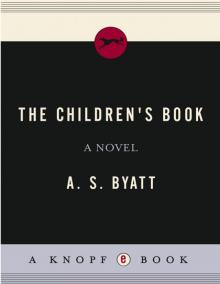 The Children's Book
The Children's Book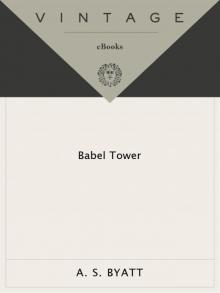 Babel Tower
Babel Tower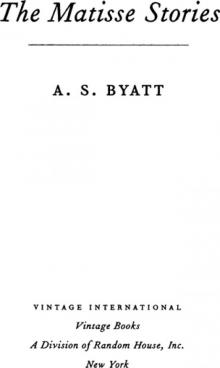 The Matisse Stories
The Matisse Stories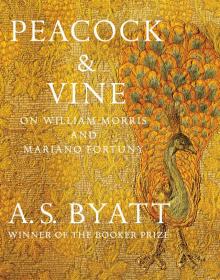 Peacock & Vine: On William Morris and Mariano Fortuny
Peacock & Vine: On William Morris and Mariano Fortuny Elementals: Stories of Fire and Ice
Elementals: Stories of Fire and Ice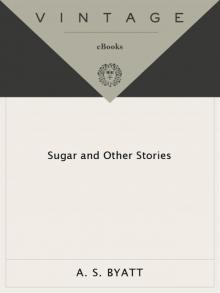 Sugar and Other Stories
Sugar and Other Stories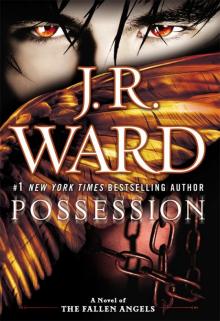 Possession
Possession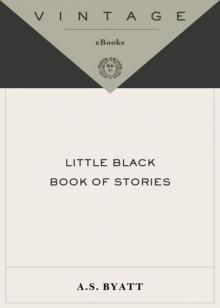 Little Black Book of Stories
Little Black Book of Stories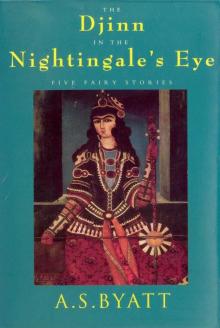 The Djinn in the Nightingale's Eye
The Djinn in the Nightingale's Eye The Virgin in the Garden
The Virgin in the Garden The Game
The Game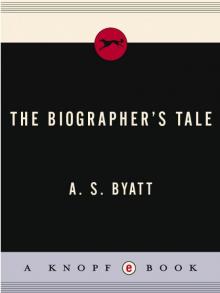 The Biographer's Tale
The Biographer's Tale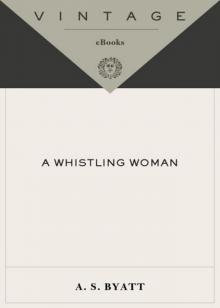 A Whistling Woman
A Whistling Woman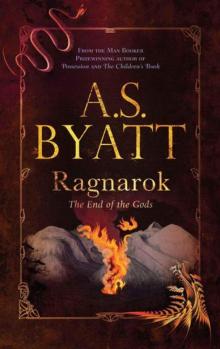 Ragnarok
Ragnarok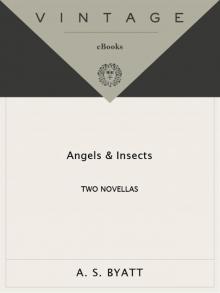 Angels & Insects: Two Novellas
Angels & Insects: Two Novellas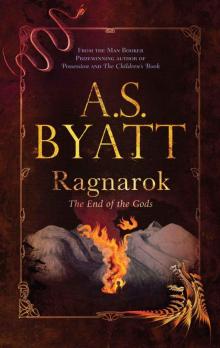 Ragnarok: the End of the Gods (Myths)
Ragnarok: the End of the Gods (Myths)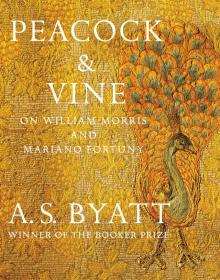 Peacock & Vine
Peacock & Vine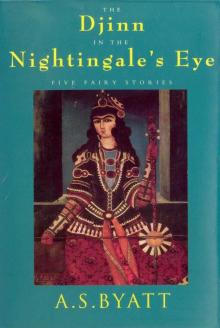 The Djinn in the Nightingale's Eye (Vintage International)
The Djinn in the Nightingale's Eye (Vintage International)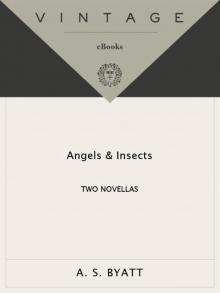 Angels and Insects
Angels and Insects The Arabian Nights: Tales from a Thousand and One Nights (Modern Library Classics)
The Arabian Nights: Tales from a Thousand and One Nights (Modern Library Classics) Elementals
Elementals